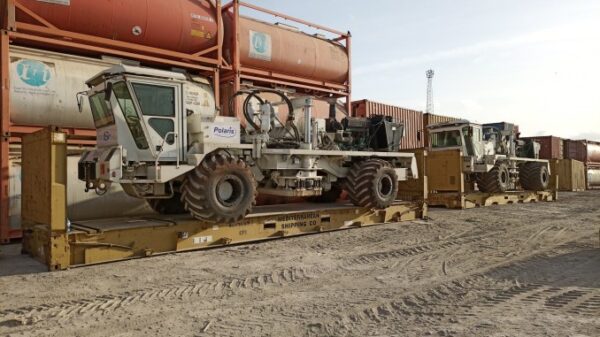Equipment for gas project lands

The next stage in the exploration for gas and oil in the Muzarabani area is imminent with 20 very large trucks coming through Beitbridge over the next few days carrying the state-of-art equipment to be used by Australian firm Invictus Energy in a seismic survey to identify the best sites for sinking exploration wells.
Australia Stock Exchange-listed Invictus Energy, parent firm of Geo-Associates that holds the Muzarabani grant, has registered significant progress in trying to establish if there are commercially viable reserves of oil and gas in Zimbabwe’s Cabora Bassa Basin, the geological formation underlying the Muzarabani area.
French oil giant Mobil in the early 1990s did initial seismic surveys, but decided not to follow up. However, Invictus using more modern data processing techniques, reprocessed the data gathered and found strong evidence that the underlying geological structures had the domes and traps that could indicate oil and gas in Muzarabani.
Exploratory wells are required to see if those domes and traps have indeed trapped the organic matter that decomposes to gas and oil, but before that stage it is necessary to map the underlying geology more precisely, and that is what Invictus is now going to do.
Mines and Mining Development Minister Winston Chitando said yesterday the equipment should be at the site in the next 10 days.
“Seismic equipment offloaded from the ship in Durban today. It is expected at Beitbridge border in the next three to four days en route to a workshop in Harare for service checks for a week or so before proceeding to Muzarabani,” said Minister Chitando.
Writing on micro-blogging site, Twitter, the Deputy Chief Secretary to the President and Cabinet (Presidential Communications), Mr George Charamba, also said the successful delivery of the equipment to be used in the company’s seismic survey, followed the approval by President Mnangagwa of the firm’s Petroleum Exploration Development and Production Agreement (PEDPA).
The PEDPA provides the framework for progression of the Muzarabani project through the exploration, appraisal, development and production phases and obligations and rights of each party over the project lifecycle.
The Australian firms needed this spelt out precisely before they could commit the large sums required for the next stages of the exploration.
“Over 20 by 30-tonne low-bed trucks will roll into Zimbabwe in the next few days taking the equipment straight into a workshop for service checks before commencing the survey.
“The Zimbabwean industrial landscape will never be the same. The US$12 billion mining economy (target by 2023) is within reach,” Mr Charamba tweeted.
As part of the building blocks for Vision 2030, by which Zimbabwe should have attained upper middle income economy status, the Government is working on growing mineral exports from US$3,7 billion to US$12 billion a year although much of any natural gas and quite a bit of any petroleum discovered in Muzarabani is more likely to be used within Zimbabwe to fuel a major power station, provide feedstock raw materials for fertiliser and other chemical industries and allow a modern refinery to be built for liquid fuels and other petroleum-based raw materials.
“Brick by brick as promised by President Mnangagwa, we are building Zimbabwe turning the fortunes of the Great Plateau between the Zambezi and Limpopo Rivers for the better,” Mr Charamba said.
Invictus Energy awarded Canadian firm Polaris Natural Resources the contract to undertake seismic survey, a way of mapping geology through sub-surface vibrations.
Polaris intends to conduct, process, and interpret a minimum of 400 kilometres of seismic lines to define the best site for the first well, Mzarabani-1, as well as possible sites for future tests or production wells.
Invictus Energy said recently that the Canadian firm had conducted over 1 000 seismic projects since 1996 and introduced the first “low impact seismic crew” into Africa in 2008.
Polaris has conducted over 15 seismic surveys in East Africa and has been well accepted in all the communities where it has operated, which was a plus when getting the contract to work in Zimbabwe.
The Australian company will use the data gathered from the seismic survey to pinpoint sites on which oil and gas test wells will be drilled. As the wells could be as much as 4km deep and cost up to US$15 million each, Invictus is keen to ensure that the first well is sunk in the best possible location.
President Mnangagwa said the PEDPA agreement would provide a pathway for Zimbabwe to exploit its hydro carbons while commercial discovery of oil and gas could bring significant downstream economic benefits.
Benefits expected to accrue include energy self-sufficiency, petro-chemicals, increased revenue to the fiscus, growth of exports, new job creation and the emergency of a multiplicity of downstream industries among others.



